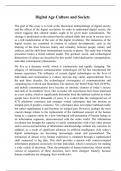Digital Age Culture and Society
The goal of this essay is to look at the theoretical underpinnings of digital society
and the effects of the digital revolution. In order to understand digital society, the
article suggests that cultural studies ought to be given more consideration. The
strategy is predicated on the notion that the cultural shifts that occur in society serve
as a full manifestation of the core of the digital revolution. The transitions of the
digital society are examined in relation to cultural developments, such as the
blurring of the lines between reality and virtuality, between people, nature, and
artifacts, and the shift from informational scarcity to plenty. The study that is being
presented creates a broad cultural model. The spiritual, social, and technological
dimensions of culture are described by this model. Individualization, transportation,
and other contemporary phenomena.
We live in a dynamic world, which is continuously and rapidly changing. The
ubiquity of information communication technologies (ICTs) has transformed the
human experience. The influence of current digital technologies on the lives of
individuals and communities is evident, and one may claim, unprecedented. Over
the past three decades, the technological convergence of communications and
computing has evolved and flourished. The internet, the World Wide Web (WWW),
and mobile communications have become an intrinsic element of today’s society
and each of its members’ lives. Our everyday life experiences have been immersed
in a new reality, which is significantly dissimilar from the habitual realities in which
people have lived for thousands of years. It is evident that the widespread use of
ICTs platforms constructs and arranges virtual cyberspace that has become an
integral part of people’s existence. Yet, cyberspace does not replace habitual reality
but rather supplements it and becomes its integral part. However, perhaps the most
crucial change relates to the replacement of the traditional concept of the human
being as a separate entity by a new ontological self-perception of human beings as
an information organism, interconnected with the entire world. The information
revolution has brought the capacity to easily communicate with every other person
and to access myriad forms of information and knowledge without any concerns. In
addition, as a result of significant advances in artificial intelligence (AI), today’s
digital technologies are becoming increasingly smart and personalized. The
interaction of almost every human experience is mediated through a sophisticated
shell connected to big data. This shell provides a person with context-oriented
information prepared exclusively for that individual, which is necessary for making
a wide variety of decisions. Thus, the principles of human behaviour, which mostly
consist of sequences of these decisions, have been changed. Namely, because
human conditions are changing, their worldviews.




